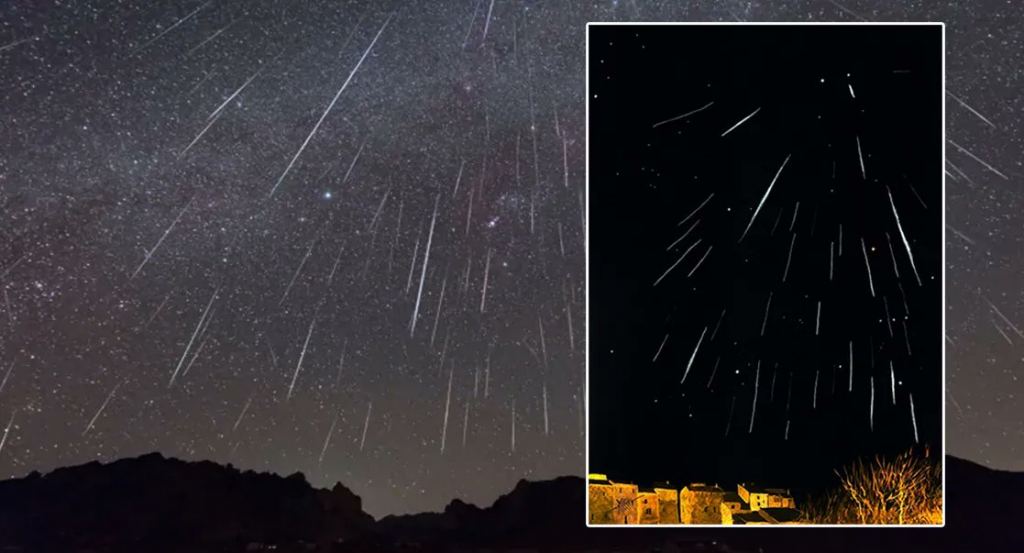Meteor showers are a great way to share a love of astronomy with those who might not be as familiar with it. Almost everyone loves watching streaks of light flash across the sky, but usually, it’s so intermittent that it can be frustrating to watch. That’s not the case for the next few weeks, though, as the annual Geminid meteor shower is underway until December 24th.
The Geminids are one of the most active meteor showers of the year. But, unlike many others, their source is an asteroid rather than a comet. 3200 Phaethon, named after the son of Helios, the Greek god of the Sun, is the named asteroid that travels closer to the Sun than any other.
Part of that path crosses Earth’s orbit, and even though it is technically an asteroid, Phaethon acts somewhat like a comet when it gets close to the Sun, shedding particles that eventually end up burning up in Earth’s upper atmosphere as meteors. This year, that light show will peak around the night of the 13/14th of December. Typically, astronomers can look toward the constellation Gemini and, in particular, the bright star Castor.
It is an approximate sky location for the meteor shower’s “radiant,” meaning that most visible meteors will start somewhere near. UT video on meteor showers There are a few confounding factors for observers this year, however. The first is the Moon.
It will be in a waning gibbous phase and will be approximately 72% full on the night of the 13th, making this year a much brighter night than average. Also, the Moon will rise at around 10 PM local time, so there will only be a few hours of actual darkness on the night of the 13th before the Moon’s light makes its presence known and washes out the light show for many smaller meteors. Gemini will also be near the horizon in those few hours, making it challenging to see meteors that slope “downward” toward the horizon itself.
However, many of the early meteors are unable to penetrate far into the atmosphere and therefore end up actually taking longer to burn up. Known as “Earthgrazers,” these meteors make up some of the more spectacular meteors in the shower. As anyone in the northern hemisphere will tell you, the weather is another potential difficulty.
December isn’t known for its clear nights, which might be no exception on the 13th. However, the Geminids will still be visible on other nights, though there is a dropoff of about 50% each night, and exponential decays like that mean that very quickly, there will hardly be any at all. At its peak and without any moonlight, amateur astronomers could see anywhere up to 1 meteor per minute on the night of the 13th.
Have questions about the Geminids? This Q&A might help answer them. If the clouds roll in on the 13th in your area, you can at least take some solace in the fact that the Moon will rise 30 minutes later the next night and 30 minutes later again the night after that, providing more time for some unobstructed viewing. And if you decide to take the time to do so, organizations such as the American Meteor Society could use your help in cataloging this year’s Geminid shower.
There’s a link below to an article they wrote on the shower and a guide on how and where to provide any quantitative data that you might be interested in taking during your meteor-watching expedition. Now the best everyone can do is hope for clear skies in the not-too-distant future. Learn More:AMS – Viewing the Geminid Meteor Shower in 2022UT – Brrrr: Bundle Up For the 2021 Geminid MeteorsUT – The Curious History of the Geminid MeteorsUT – Geminid Meteor Shower and Meteorwatch Lead Image:Time lapse of the Geminid meteor shower in Arizona and an inset of a time-lapse in France.
Credit – Malcolm Park & Michel Deconinck The post The Geminids Will be Peaking on December 14th. They’re Usually the Most Active Meteor Shower Every Year appeared first on Universe Today. .
From: universetoday
URL: https://www.universetoday.com/159063/the-geminids-will-be-peaking-on-december-14th-theyre-usually-the-most-active-meteor-shower-every-year/



